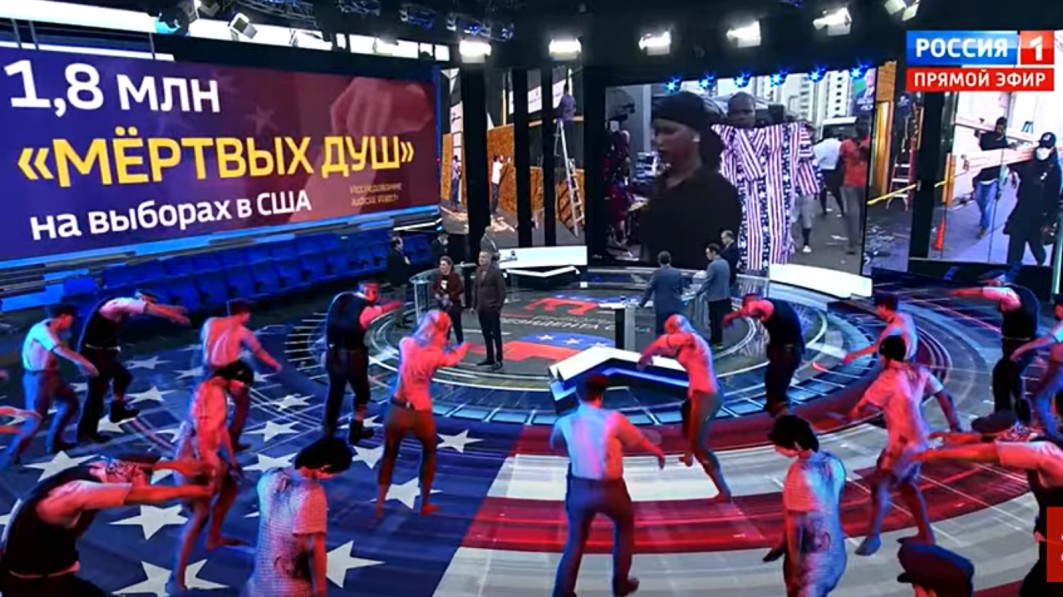- Read more on the troop buildup: Four Ukrainian soldiers killed in Donbas as Russia continues troop buildup and escalates propaganda
In the times of a global infodemic, misleading information, conspiracy theories, and outright lies seem ubiquitous. It would be almost tempting to see disinformation as an unpleasant but inevitable feature of contemporary information space. However, the past week has been a reminder that for the Kremlin, disinformation is also a tool to support its military posturing and even hostile operations on the ground.
Disinformation targeting Ukraine, not unlike in 2014, has preceded and accompanied the most recent build-up of Russian armed forces along the Ukrainian borders. This situation again underscored the pro-Kremlin media’s “traditional” focus on Ukraine: out of over 11,000 examples of pro-Kremlin disinformation collected in the EUvsDisinfo database, over 4,100 target Ukraine.
Top hits of pro-Kremlin disinformation
As Russian military equipment and troops moved towards Ukraine, the pro-Kremlin media recycled a medley of its greatest disinformation hits presenting Ukraine both as a relentless aggressor (attacking its own territory!) and a hapless puppet of the US; painting Ukraine as nationalist to the extent of imminent genocide of Russians in Donbas, and claiming that Ukraine isn’t even a state. For some people, holding two contradicting beliefs may be a sign of cognitive dissonance. For the pro-Kremlin media though, it is just a matter of delivering tailored messages to its target audiences.
Incendiary as these disinformation claims appear, they are also mind-numbingly repetitive. This week the pro-Kremlin media again
- falsely accused Kyiv of violating the Minsk Agreements, just as in 2015; 2016; 2017; 2018; 2019; and 2020.
- It perpetuated a myth of “abandoned Ukraine” as in 2016; 2017; 2018; 2019; and 2020.
- Disinformation claims that the US has been pushing Ukraine to a confrontation with Russia and the “civil war” got new visuals this week, but they followed a well-established pattern we have seen time and time again.

As if drawing from its “best practices”, the pro-Kremlin media also delivered highly emotional messages about a small boy allegedly killed by a Ukrainian army drone in Donbas. The claims (which were debunked by independent Russian and Ukrainian fact-checkers) were circulated across the Russian state-controlled media and were used by the speaker of the Russian Duma to demand the discussion of excluding Ukraine from the Council of Europe.
This approach is similar to the infamous “crucified boy” story the pro-Kremlin media spread back in 2014 to incite hatred against Ukrainians among Russian domestic audiences, and justify its armed aggression against Ukraine.
Toying with “genocide”
In this context, the claims that Ukraine was about to incite a genocide of Russians in Donbas, which re-appeared in the pro-Kremlin media this week, are particularly worrying. A member of the Russian Duma, Yuri Shvytkin, reportedly even made a suggestion to prepare an appeal to “parliaments of states” to condemn the actions of “Ukrainian henchmen” regarding the “genocide” of the Russian population.
Although pro-Kremlin sources use the term liberally (water and visa “genocide” in Crimea; “genocide” of Ukrainians by refusing to buy Sputnik V vaccine), such claims perpetuate a prominent pro-Kremlin disinformation trope about “Nazi/Fascist” Ukraine, hell-bent on destruction and dehumanization of people.

The Kremlin has used unfounded allegations of genocide to justify its aggression in the past. Today as well, such claims are meant to help the Kremlin mobilize public support for its actions by betting on public moral outrage. One of the pro-Kremlin pundits and a frequent guest of political talk shows on Russian TV, the editor of Russian National Defence magazine, Igor Korotchenko, said exactly that:
“Neither intimidation, nor wailing from the Western capitals, nor collective performances of Zelenkyys [of this world] will impact Russia’s determination not to allow to conduct genocide in Ukraine’s East. […] Russian public opinion will not allow this crime to happen” (“60 Minutes”, Rossiya 1, broadcasted on 05 April 2021 [30:04 – 30:48])
As it has done multiple times in the past, the pro-Kremlin media is trying to shape public opinion where, in the words of Peter Pomerantsev, “nothing is true and everything is possible”. Even a demonstrative nuclear strike “somewhere in the ocean”, in order to teach Ukraine and the West a lesson.
On vaccines
Despite its renewed focus on Ukraine, pro-Kremlin outlets found opportunities to engage in vaccine-related disinformation this week, with a little help from the Russian Foreign Intelligence service.
Multiple Russian outlets have republished a press release by the Russian Foreign Intelligence Service (SVR), alleging that “European bureaucrats” were taking urgent measures to discredit the Sputnik V vaccine. To support such an argument, the Russian intelligence thought it wise to make up an entire quote of an EU official, allegedly urging the European Medicines Agency to delay the authorization of Sputnik V until July or August. At the same time, the French edition of Sputnik claimed that the head of the European Medicines Agency, which is currently conducting the rolling review of Sputnik V, said she would seek to ban the Russian vaccine.
Needless to say, none of these claims are true. But they follow a trend in the pro-Kremlin media to portray the EU as predisposed against the Russian vaccine, with the aim to undermine trust in the European vaccination efforts. The official Twitter account of the Sputnik V vaccine dutifully contributes by increasingly engaging in the trolling and discrediting of the European media, institutions, and politicians.
Further reading:
- Four Ukrainian soldiers killed in Donbas as Russia continues troop buildup and escalates propaganda
- Moscow will be ready for a war against Ukraine ‘in a month,’ Felgenhauer says
- Biden phones Zelenskyy amid Russian troop build-up along Ukrainian borders and escalation in Donbas
- Ukraine is back in the focus of pro-Kremlin media (2020)
- 1001 pro-Kremlin disinformation messages: Ukraine remains top target (2019)
- Ukraine remains top target of Russian disinformation (2019)
- How Russian propaganda denigrates Ukraine (2018)
- Ukraine targeted by disinformation campaign to restore “friendship” with Russia (2017)
- “Ukraine will turn into a banana republic”: Ukrainian elections on Russian TV
- How Russia's worst propaganda myths about Ukraine (2016)






